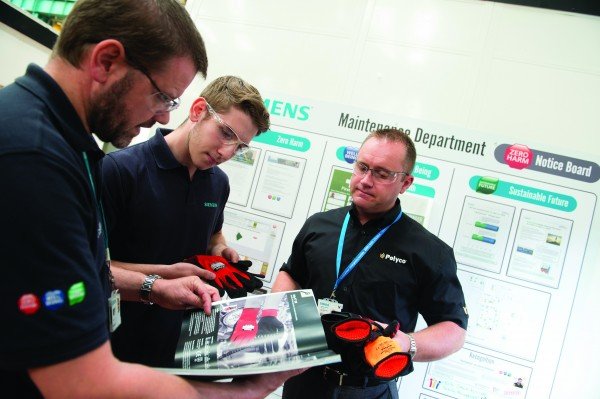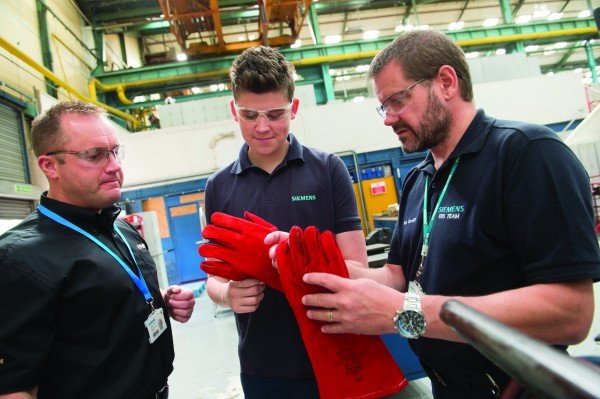Siemens workforce was instrumental in the roll out of a hand safety project, which involved collaborating with Polyco on a bespoke range or products. As Danielle Turton reports, the project has slashed the number of hand injuries.
With a workforce where the average time served is over 20 years, it’s inevitable that employees at Siemens Power Generation Services, Power and Gas, know their trade and what tools they need to make a job safe.
Maintaining, engineering and servicing steam, and gas turbines and generators around the world calls for safe and robust processes, precise engineering and an unrivalled level of expertise.
Even today in the power and gas service industry, with the availability of advanced machinery and tools, components and work need to be quality checked, and inspected. The service industry is a very ‘hands on’ job. Having seen a growing trend in minor hand injuries, employees at Siemens decided to take safety into their own hands.

Zero harm
The operational team, made up of employees working in a state-of-the-art service facility as well as a highly skilled and globally mobile field service team, based at Siemens Newcastle is made up of around 600 employees. They are employed in the blade shop, components and heavy machine departments, and the field service teams are responsible for supporting customer sites around the world.
At Siemens, safety, which is promoted through the company philosophy of zero harm, is always the number one priority. Zero harm means zero harm to employees, customers and the environment. The culture is such that, every single employee is encouraged to challenge any unsafe behaviour and is expected to get fully involved in safety improvements and initiatives.
“Over the last couple of years we noticed a small rise in hand injuries in our service facility. Injuries like grazes and minor cuts to hands were increasing so it was clear that we needed to reassess our approach to hand safety,” explains Mark Armstrong, head of the service facility, on the introduction of Siemens’ hand safety project.
“The team in this area of the business has years of experience, so we wanted to engage with them to find out why injuries had increased and get their ideas about how we could improve. Through a simple workshop, which involved employees from operations and EHS, we identified an issue with the safety gloves we were using.”
Armstrong explains that traditional safety gloves were either too thick or didn’t have the required grip for accurately handling our machine tools and components.
“The team needed something that gave them required level of protection but that also allowed them to handle delicate components and machinery without feeling clumsy or restrictive,” he continues.
Engaging with Polyco
After identifying the problem, the next step was for the team to improve the quality of the safety gloves they were using. However, to do to this they needed a trusted supplier to help make the changes. Polyco, a specialist protective personal equipment supplier, was a natural choice.
“Polyco have their own safety philosophy, which closely identifies to our own at Siemens,” explains Simon Kennedy, head of EHS at Siemens on the link up.
“As a business they completely understand and support our commitment to zero harm so we selected them to help us develop a solution. Having supplied gloves to our business for many years, Polyco already had an understanding of the environment, tasks and challenges associated with our industry.”
Kennedy explains that one of the key elements of success was that Siemens needed a product that didn’t compromise on safety but that helped the team to deliver the quality products and services that its customers expect.
“After some initial discussions it was clear that the type of glove we needed wasn’t available as an off-the-shelf product,” he continues.
“The team at Polyco worked with our employees to develop a bespoke, specially designed range of gloves. These tailor-made gloves gave employees the grip and flexibility required to handle small metal components, along with the thickness and protection that they needed to work safely in this environment.”
After some initial trial periods, the new gloves were launched in 2014. To date, employees have given positive feedback. Most importantly, safety statistics have shown a major improvement and reduction in hand injuries. Engaging with employees and developing a bespoke solution have cut hand injuries in this area cut by 47 per cent since 2014.
Building on the campaign
The success of this initial work, prompted a wider business campaign focused on hand and finger safety, called ‘Safety: It’s in your hands.’
“After the success of the initial glove development project with Polyco, we wanted to build on the momentum,” explains Andy Whitehead, EHS manager on the next stage of the campaign.
“Hand injuries can also occur outside of operational areas and it’s important that, as a business, we address and try to reduce the risks associated with every job role. Employees within office areas are just as susceptible to hand injuries and statistics prove this type of injury is one of the most common.”
As Whitehead points out, a person’s hands are their most important tools, whether they are working on machinery or typing on a keyboard: We all need to use our hands every single day at work.
“We used Polyco as a sounding board and asked for their expertise to help us develop a business-wide campaign,” he adds. “Through a DVD, posters and a briefing pack we challenged employees to think differently about hand safety and to come up with ways to make everyday tasks safer in their own departments.”
 The campaign was rolled out across the operational teams at Siemens where the aim was to raise the awareness of hand injuries and showcase the preventative tools available.
The campaign was rolled out across the operational teams at Siemens where the aim was to raise the awareness of hand injuries and showcase the preventative tools available.
The commitment to safety at Siemens is clear, with the business even investing in a specially designed zero harm vehicle earlier this year. The zero harm vehicle is custom-made, completely portable and can host meetings for up to 25 people at a time. Holding safety meetings on operational sites or at customer power stations is now incredibly easy and the team are now using this vehicle to help spread the hand-safety message.
“The zero harm vehicle has made taking time out to talk about hand-safety, and other safety topics, even easier,” explains Whitehead.
“We can now take the vehicle directly onto a power station and run through the Polyco materials or just have a general safety discussion. With this approach we’re able to reach employees working on sites and we’re also able to engage with our customers. Our customers are just as dedicated to safety as we are, so it’s important that we work together and collaborate to keep people safe.
It’s a new approach and has already really made a difference, he concludes. “Polyco have done a great job; we now have an increased awareness of hand safety throughout the business with our customers and have developed a new bespoke range of gloves for our operational teams.”
Danielle Turton is communications manager at Siemens

The Safety Conversation Podcast: Listen now!
The Safety Conversation with SHP (previously the Safety and Health Podcast) aims to bring you the latest news, insights and legislation updates in the form of interviews, discussions and panel debates from leading figures within the profession.
Find us on Apple Podcasts, Spotify and Google Podcasts, subscribe and join the conversation today!




